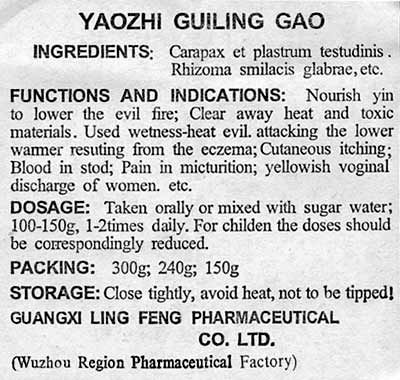Something light for the weekend.

Yaozhi Guiling Gao. I still haven't found any meaningful characters for Yaozhi, but Guiling Gao is definitely 龟苓膏 turtle fungus paste :).
Blood in stod? I am guessing "stool". Anybody?
Found in Victoria, British Columbia, Canada. Many thanks go to Michael, who says this is
from some sort of medicinal jelly that I purchased for $2.50 in Chinatown because I liked the decorative jar it came in.Beware of the "Used wetness-heat evil" ...
I think that's the one attacking you after an hour-long shower session with boiling hot water.
P.S. And, by the way, I also haven't found any reference to treating "yellowish voginal discharge of women"...




22Comments:
Yaozhi is "药制". I have no idea what is the best way to translate it. But it means like "made by Chinese traditional medicine" or implies that 龟苓膏 contains medicinal ingredients.
"yellowish voginal discharge of women" is 妇女黄带. It is something like colpitis or vaginitis.
龟苓膏挺好吃的:)
龟苓膏挺好吃的~
Yaozhi Guiling Gao is stand for "药制龟苓膏"
http://www.yn98.com/html/jiankang/zhongyao/20061121/10028.html ^^;
I think YAOZHI means medicated,'药制' in chinese.
'blood in stod'? i am confused,too.maybe it can be explained as blood-activation in traditional Chinese pharmacology^^
about 'voginal', i wonder it's vaginal or not. or help surging instead? sigh...
龟苓膏最早产于梧州,是历史悠久的传统药膳食品,相传是皇宫中专供皇帝食用的名贵药物,距今已八百多年。龟苓膏主要由龟板、地黄、茯苓、甘草、金银花、蒲公英、菊花等十几种名贵中草药与蜂蜜精心熬炼而成,其性温和,不凉不燥,具有清热润燥、滋阴养颜、润肠通便等功效。
your blog is so cute,i want to join the discussion too,hoho
YAOZHI means made from herbal medicine 藥製
YAO 藥 medicine
ZHI 製 made from
I guess so
"yaozhi" is 药制,something make with Chinese traditional medicine.And the yellow stuff is the leucorrhea looks yellowish
This is so excellent!
Thanks, everybody, for the energetic help on this one!
Best,
olr.
you may take a look at this,really funny....
fire bird??
http://tkfiles.storage.msn.com/y1pHLoeGuWj_t84lRgvQ2mORqN1NsPITrTg--lXO24ILiNbKKATwZW-XqdSL9JaRirh
I'm from China and I just love your blog..Actually translating Chinese into English is not so easy, for there's a lot of nouns which you can't find anything corresponding in English..even some you cannot possibly explain the meaning in Chinese easily.
I remember it was said that in the early 1990s there was a sign written "please pay attention to pubic(public) sanitation" somewhere around the Badaling Great Wall.
In the following parts I will break this strange "GUILING GAO" down into separate sentences and words and explain them one by one. Hope that I can help :) However I am a student in Artificial Intelligence so I do not have very accurate knowledge on medicine, so the following information may have some mistake in it.
Firstly, YAOZHI is written as "药制" in Chinese as mentioned in the comments. This is a technique for production of Traditional Chinese Medicine which is also known as "Chinese Herbal Medicine"(中草药). A most typical way to perform this is to soak the raw materials in honey and extract the useful ingredients out of them.
Guiling Gao is made out of tortoise shell, Chinese tuckahoe, honeysuckle, liquorice and so on.
About the "fire" and "heat" that appears frequently in the article: this is inherited from the thought of ancient Chinese people. We believe that the human body is controlled by two forces which are called "Yin(阴)" and "Yang(阳)". The "fire" and "heat" often represents an extreme "Yang". For example, when you have a cough and feel your throat dry, or you feel hot and easily vexed, a Chinese people will say that you are attacked by the "fire" or "heat". Imagine that you are in a desert without water and directly face the sun - that might be a typical "fire" :) "Yang" gives people a feeling of warm and bright, while "Yin" gives people a feeling colder and darker. Also, people believe that men are more "Yang", women are more "Yin".
When "Yin" grows, "Yang" is supressed, and vice versa. It is believed that young people will look more "Yang" while people grow more and more "Yin" as they grow old. Generally we should be "Yang" enough - but not too far as "fire" - to have a healthy body. The "Yin" and "Yang" work together to form the force of our body. May the force be with you :)
In this way you might have a more clear view of the so-called "wetness-heat evil" :) that means that your body does not work well under a hot and wet weather condition, or, say, you are "attacked" by a wet and hot "Yang" devil:)
About the "Blood in stod": I guess that you're right, it might be a mistake of "stool". However, I believe that the translator has not translated the Chinese word correctly. Actually, Guiling Gao is used to relieve constipation, not blood in one's stool.
About the "yellowish voginal discharge of women": A more accurate translation might be "the vagina secretion has a strange yellow color". As mentioned in one of the comment, this sometimes indicates colpitis or vaginitis.
Generally speaking, Guiling Gao is originally used as a Traditional Chinese medicine, while nowadays people, more often, take it as a sort of food which has some hygienical function. In supermarkets or foodstores in China it is often seen.
Best wishes, sir. It is always good to see that there are so many friends who love Chinese culture.
Dear Yangqing,
thank you very much for your extensive comment.
I think it is next to impossible to translate TCM into proper English without the basic knowledge of the meridians, the Yin/Yang aspect asf.
But it's nevertheless great that they try hard in 梧州.
Know what ? I've been wondering what's "Evil fire" ?? until when I reach the bottom "龟苓膏"
Hi Vivien,
because you are Chinese and know 龟苓膏 from your own experience?
Best,
olr.
"stod": take "stool" and move the 'l' slightly left - 'ol' becomes 'd' - voila! A simple case of myopia ...
Seems that Chinese apply the resilience of pictures (a slight bending of a line would be admired as calligraphy) to western spelling, hence "voginal". What is a little hook between friends?
I had some Engineers translate a sales brochure into Chinese, leaving some key words in English. They managed to misspell the product name(!) in 3 different ways on 4 pages and even were quite annoyed when I demanded correction, because nobody would notice anyway (true!).
Damn western nit-pickers ...
Classic example!
Thanks for sharing.
Best,
olr.
P.S. But nut-, sorry, nit-picking makes the difference between professional and, well...
Glad to find your blog is such an eye-opener!
The comment made by Yangqing is very informative, and I guess, correct.
I also googled the original Chinese text for this translation and found the passage starting with “FUNCTIONS AND INDICATIONS” is actually a rendering for this:
【功能与主治】滋阴降火,清热解毒。用于湿热下注引起的湿疹,皮肤瘙痒,便血,尿痛及妇女黄带。
One more thing to add. Translating text associated with traditional Chinese medicine is very challenging, if not frustrating. Confusing terms are the major contributor to the difficulty, making understanding a tough, and in extreme cases, an impossible task for non-expert translators.
The words “wetness-heat evil, attacking the lower warmer” seem an attempt, though not satisfactory by any means, for rendering the Chinese term “湿热下注”. And the explanation given by Yangqing above runs risk of oversimplification and, baffling average readers by introducing ever more perplexing terms “Yin” and “Yang”. I googled the Chinese term and found Yahoo hosts a webpage giving slightly varying, and detailed explanations.
http://ks.cn.yahoo.com/question/?qid=1307060303517&source=ysearch_ks_question_ask
Hope someone may find it helpful.
Thanks for the effort, Cyril.
Yin and Yang are very problematic terms, indeed, but - as you said - this blog mainly tries to be an eye-opener for both worlds.
Best,
olr.
"Pain in micturition"... I guess it meant PMS (Pre-menstrual Syndrome)or pain during menstruation? Go figure!
Post a Comment
<< Home